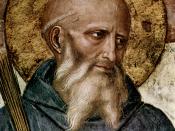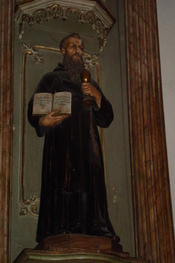Saint Benedict of Nursia, Italy (c. 480 - died c. 547) was a founder of Christian monastic communities and a ruler for monks living in that community. He was a very accomplished man. Throughout his life span he came to the aid of many people. He was a guide to many in their search for God. His work reinvented monastic life. The teachings of Saint Benedict still affect the lives of people today. Through hard work, and devotion, this modest man helped shape history.
In the sixth century, Saint Benedict drafted his famous Rule; this is when the monasticism began to grow hastily in Western Europe. He obtained much of these ideas from the Latin text, "Rule of the Master". (Coffin 174). Saint Benedict called his document: "a simple rule for beginners" because it was "notable for its brevity, flexibility, and moderation" (Coffin 174). Saint Benedict wrote his Rule for all who wanted to become monks.
This Rule was a defined cycle of prayers, communal worship and lessons. The fundamental rule was that each day was divided into a sequence of activities with an emphasis on prayer and manual labor. Benedict declared that physical labor was encouraged because idleness was an "an enemy of the soul;" (Coffin 174). Monks were encouraged to practice a powerful relationship with God. Ways for Monks to practice discipline were to include fasting, silence, to accept bodily discomfort, and not to own anything. One of the most important rules for the monks was to be obedient to their spiritual leader.
Saint Benedict thought that monks should only serve Christ, not study philosophy or literature. He thought that monks should be able to read well enough to understand and study the bible. The abbot was to preside over the monastery and was known as Christ's representative. The abbot should always be aware of his teaching and obedience of his disciples. Blame could fall back on him if his disciples or his self does not teach/do what is right by God. The abbot should teach with a double meaning; to show holy deeds by actions rather than through words. Monks are reminded that humility at all times entails the control of their thoughts and tongueReligious and intellectual establishments underwent important transformations throughout the middle ages. Through this time, the people of the middle ages learned what did and did not work. The Rule directs a community; it contains the moral and organizational ideals of the society. His famous Rule provides useful advice not only to monks but to everyone seeking guidance on their journey to God. Living in a community helps people become unselfish and to put someone else's needs first. The Rule teaches to respect people although they may be different. Monks should be patient with others and accept their flaws. This encourages people to seek out and accept guidance. He encouraged people to achieve peace in their lives. People may have needed to find peace because of all the events/issues that were happening around them. Peace could be essential to find because there were invasions, drought, hunger and plagues all around them. Benedict helped people get through the chaos through stability, respect and love for each other. St Benedict's work and his Rule led to a true spiritual and cultural unity.
Benedict helped the European people after the fall of the Roman Empire to find peace and order though religion. During the uncomfortable conditions of the Middle Ages, Benedict's monasteries became centers where the sciences, and arts flourished, and ancient literature was preserved. People learn the importance of seeking God in everything and at every instant. The Rule provides Christians with concrete ways for discipleship and norms. People could use the Rule as their guide to finding God in their daily life. The Rule could be a spiritual guide for people of any denominations.
Saint Benedict and his monks have transformed religious life. Benedict has done a great deal to transform monasticism and to change the lives of everyone around him. Benedict is an important person in religious history. His influence can still be felt by many today.
Works CitedCoffin, Judith G. and Robert C. Stanley. Western Civilizations: Their History & Their Culture. Brief Edition. New York: W. W. Norton & Company, 2005. 173-74: 181Halsall "Medieval Source: The Rule of St. Benedict, c.530". 1996. Retrieved on Sept 29, 2008.
http://www.fordham.edu/halsall/source/rul-benedict.html





